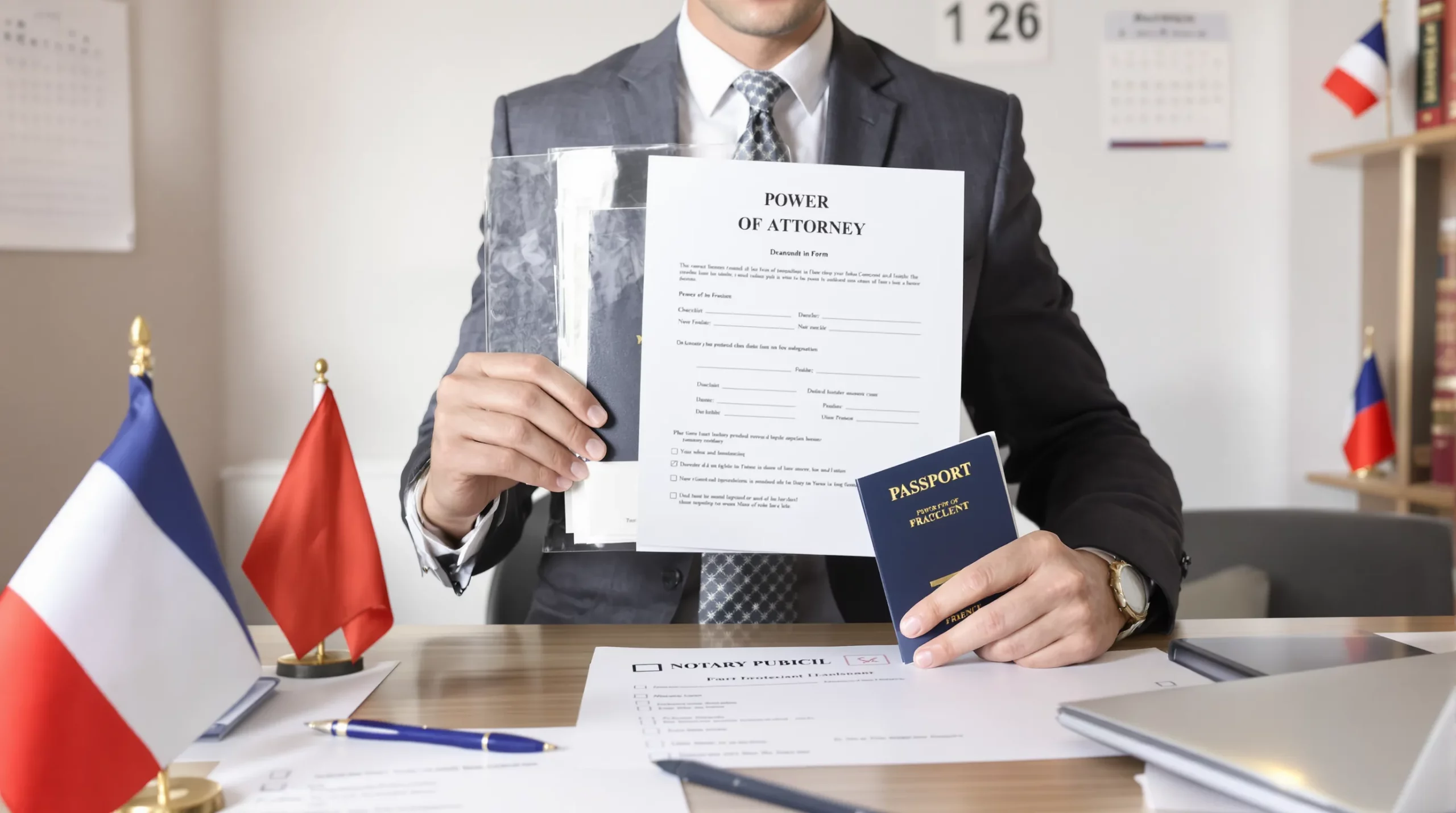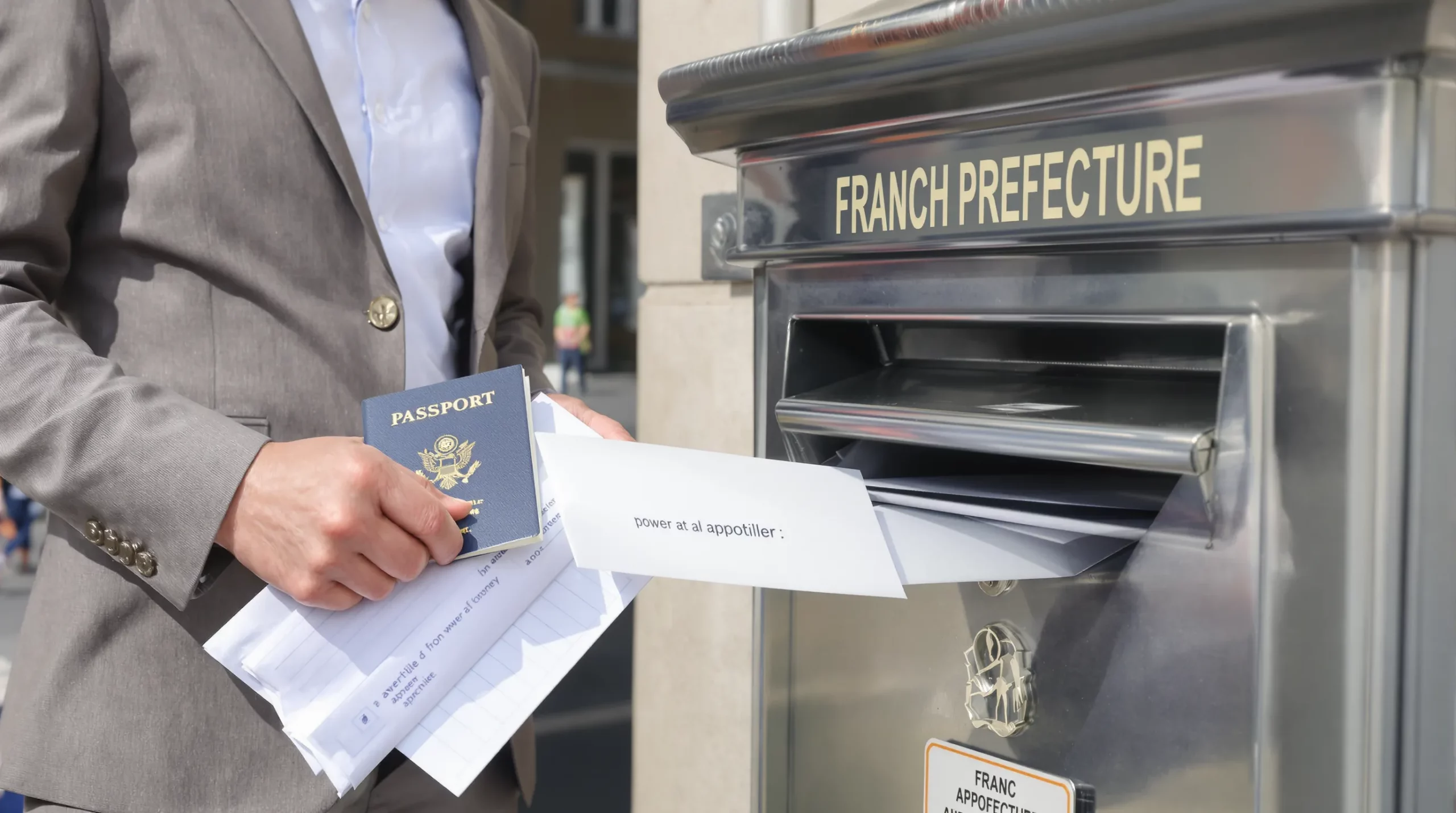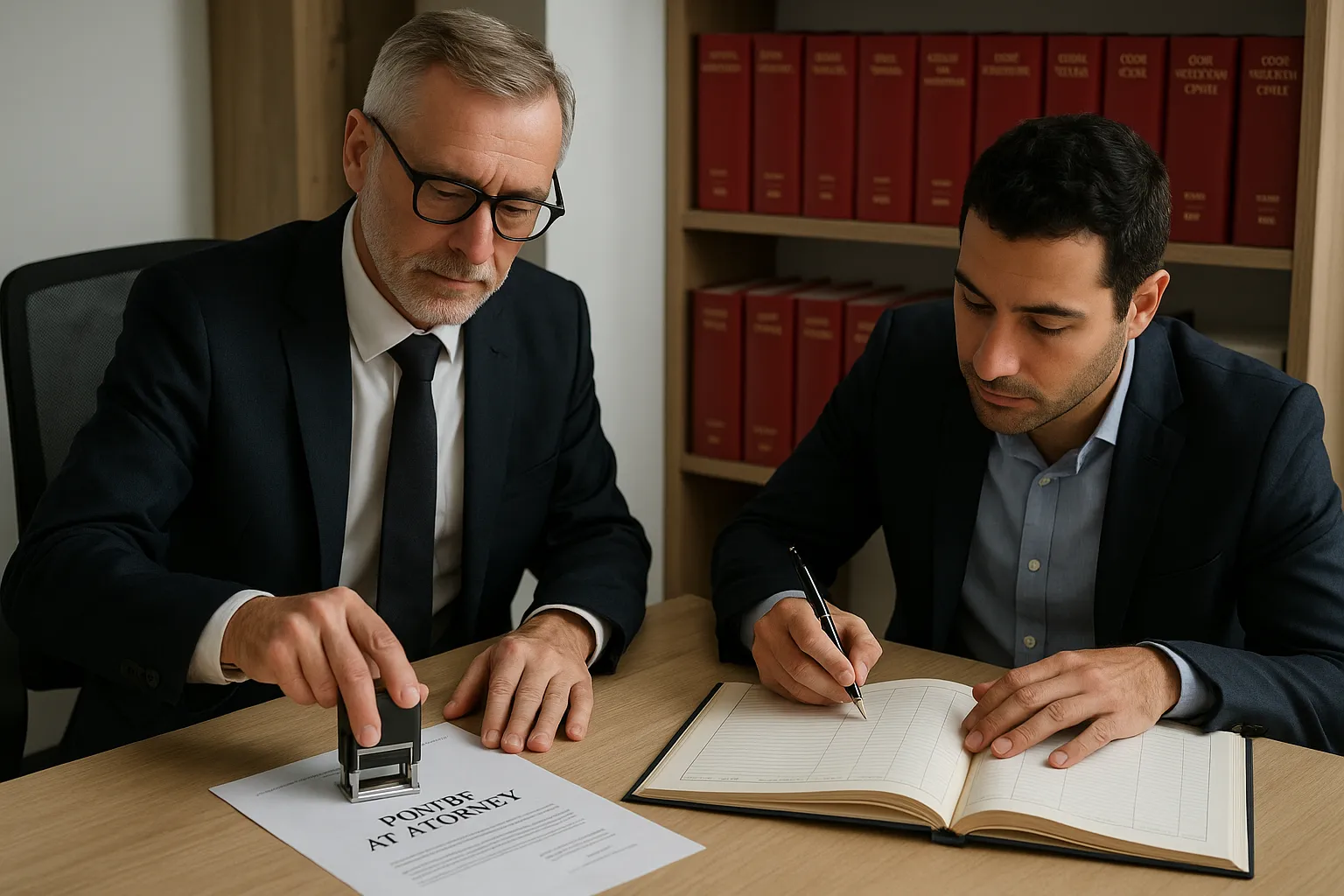Using Notaries to Authenticate Foreign Power of Attorney for Visa Files

Giving someone else the legal authority to act on your behalf can save weeks of travel and missed work days when you are assembling a French visa or residence-permit file. Yet prefectures and consulates will only accept a foreign power of attorney (POA) if the document’s authenticity can be proven under French law. In most cases that means one of two things:
- The signature of the overseas notary who certified the POA is itself authenticated (apostille or consular legalisation)
- A French notary re-authenticates the document once you arrive in France
This guide explains exactly how to use notaries—both abroad and in France—to make sure your POA is immigration-proof in 2025. It also covers timelines, costs and translation rules, and offers practical tips drawn from successful ImmiFrance cases.
1. When do you need a notarised power of attorney?
A written authorisation is often required when you cannot appear in person to:
- Submit or collect a long-stay visa at a French consulate
- File a residence-permit renewal or OQTF appeal while outside France
- Complete notarised deeds (e.g., work-contract deposit) that the prefecture demands
- Sign a rental lease, tax return or bank mandate requested in a visa dossier
Simple handwritten letters (procuration sous seing privé) may work for low-stakes tasks, but prefectures almost always demand a notarised POA for acts that generate legal liability. The relevant provisions are Articles 1984-2010 of the French Civil Code and Articles R311-4 and R522-2 CESEDA for immigration filings.
2. Understanding French acceptance rules in 2025
French authorities only care about three things:
- Identity of the principal. Name, date of birth and passport/ID details must match the immigration file.
- Authenticity of the signature. An independent professional—usually a notary—must certify you actually signed.
- Legal force in France. The certifying authority (foreign notary) must itself be recognised under French private-international-law rules.
Fail on any of these and your file can be rejected as incomplete—setting you back months or triggering an OQTF in renewal scenarios.
3. Route A: Notarisation + apostille in a Hague country
If the POA is executed in a country that has signed the 1961 Hague Convention (most of Europe, the US, Canada, India, Australia, etc.), you simply:
- Draft the POA (bilingual if possible) and sign in front of a local notary.
- Obtain the notary’s certificate with seal.
- Ask the competent authority (often the foreign ministry) for the apostille that authenticates the notary’s signature.
- Get a certified French translation of the entire packet.
- File the original + translation with the French authority.
French prefectures automatically recognise apostilles. Processing times usually run 1–5 business days. Average cost in 2025: €40 for the notary, €0-€20 for the apostille stamp (varies by country), €45-€60 for sworn translation in France.
Quick checklist
- The apostille must name the notary, not a clerk.
- Signatures must be wet ink; e-notary seals are still rejected by many prefectures.
- Keep colour scans in case the original gets lost; prefectures rarely return apostilled acts.
4. Route B: Consular or embassy legalisation (non-Hague countries)
If the issuing country is not a Hague member (Algeria, Bangladesh, Cameroon, China, UAE, etc.), you need traditional legalisation:
- Local notary certifies your signature.
- Ministry of Foreign Affairs stamps that notary’s seal.
- French consulate in that country legalises the foreign-affairs seal.
- Obtain a certified French translation.
This three-step chain can take 2–4 weeks and cost €60-€150 depending on local consular fees. Plan ahead—French consulates will not expedite simply because your prefecture appointment is near.
Tip
Many French consulates now require an online appointment for legalisation. Slots open only on certain days; set calendar alerts.

5. Route C: Have a French notary authenticate the foreign POA
If you are already in France—or the apostille/consular route is impossible—you can visit any notaire de France to perform an acte de dépôt or légalisation de signature étrangère. The French notary will:
- Verify the identity of the foreign signatory by video or passport copy
- Attach the original foreign POA as an annex to a French notarial act
- Issue an extrait authentique that French authorities must accept under Article 1369 Civil Code
Costs run €80-€150 and you walk out with several certified copies. Prefectures like this method because the liability shifts to a French professional they can discipline.
Required documents for the appointment
- Original foreign POA (even if unsigned)
- Passport or ID of the principal
- Proof of address in France
- Certified translation if the POA is not in French or bilingual
Processing time is usually 48 hours. Note that some notaries refuse to handle non-French documents; ImmiFrance can connect you to an English-speaking notary familiar with immigration standards.
6. Comparative overview
| Route | Countries covered | Average timeline | Typical total cost | Translation needed? |
|---|---|---|---|---|
| A. Apostille | 126 Hague signatories | 1–5 days | €85–€120 | Yes, sworn |
| B. Consular legalisation | Non-Hague states | 2–4 weeks | €100–€200 | Yes, sworn |
| C. French notary | Any country | 2–3 days | €120–€180 | Maybe (if POA not in French) |
7. Translation rules prefectures apply in 2025
- Must be a traduction certifiée conforme by a translator on a French Court of Appeal’s liste d’experts judiciaires.
- Every page of the original must be stamped and referenced in the translation.
- Digital signatures on translations are accepted, but print them in colour and attach the e-signature verification page.
- Bilingual POAs still require translation of the notary and apostille/consular certificates.
8. Common pitfalls and how to avoid them
- Name mismatches. Make sure the spelling and order of names match your passport exactly—including middle names.
- Out-of-date IDs. French authorities will reject a POA if the signatory’s passport is expired on the signing date.
- Unsigned corrections. Any strike-throughs or handwritten additions must be initialled by both the notary and the signatory.
- Staple removal. Do not remove staples to make copies; this invalidates the notary seal in some jurisdictions.
- Late legalisation. Consulates will not stamp a document more than six months after notarisation. Renew the POA or start over if you miss the window.
9. Filing the POA with French authorities
- Prefecture files: Insert the POA near the beginning of the dossier, right after your formulaire cerfa, so the intake clerk sees it early.
- ANEF online procedures: Merge the POA, legalisation and translation into a single PDF under “Autres pièces justificatives”. Keep it under 5 MB.
- Visa applications via France-Visas: Upload a scan, but always carry the original to your interview.
- Retain at least two certified copies; prefectures rarely return originals.

10. How ImmiFrance can help
- Match you with an English-speaking French notary who offers 48-hour POA authentication
- Provide a bilingual POA template tailored to your immigration purpose (visa collection, residence-permit appeal, real-estate closing, etc.)
- Book consular legalisation appointments in non-Hague countries via our priority partner desks
- Arrange sworn translations at negotiated rates and verify formatting before prefecture upload
- Track prefecture files and step in if a clerk questions the validity of your POA
Request a free 15-minute call at ImmiFrance’s contact page to check which route best fits your timeline.
Frequently Asked Questions
Does a power of attorney need to be less than three months old? Most prefectures accept POAs up to one year old, but some (Paris, Val-de-Marne) insist on three months. Renew if in doubt.
Can I sign a POA scanned copy and email it to the notary? Only if your home country recognises remote notarisations and the French prefecture accepts e-seals. Ask before you proceed.
Is an embassy power of attorney (procuration consulaire) enough? Yes for many one-off acts, but some prefectures still demand external legalisation of the embassy official’s signature. Verify local practice.
What if my country’s notaries do not exist? Use a lawyer empowered to administer oaths, then legalise the lawyer’s signature at the French consulate.
Can one POA cover multiple immigration steps? Yes—draft it broadly (“toutes démarches auprès des autorités françaises”) to avoid new acts for each procedure.
Take the next step
A correctly authenticated power of attorney can be the difference between meeting a visa deadline and starting from scratch. If you are unsure which path—apostille, consular stamp or French notary—matches your situation, let ImmiFrance’s experts design the fastest, prefecture-proof solution. Book your complimentary assessment today and move your immigration file forward with confidence.
